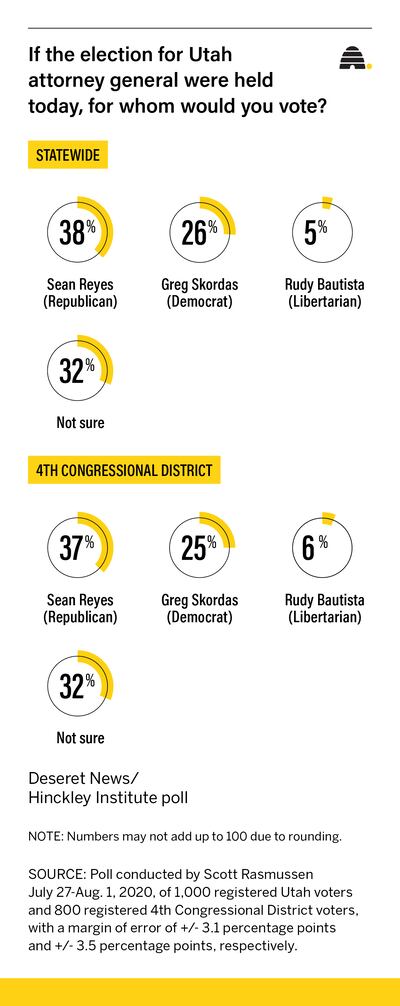SALT LAKE CITY — Incumbent Republican Sean Reyes holds a 12-point lead over his Democratic challenger in the race for Utah attorney general, but nearly one-third of voters haven’t made up their minds.
The large number of undecided voters gives Democrat Greg Skordas an opportunity to make up ground between now and November, though he faces an uphill battle to unseat a twice-elected Republican.
If the election were held today, 38% of Utahns would vote for Reyes, 26% for Skordas and 5% for Libertarian Rudy Bautista, according to a new Deseret News/Hinckley Institute of Politics poll. But the survey of 1,000 registered voters found 32% aren’t sure who they would choose.

“That’s a high percentage of voters who are not sure for an incumbent. But it says more about the office itself at this point than it says about the candidates,” said Jason Perry, director of the University of Utah’s Hinckley Institute. “These are two candidates that are very qualified.”
Independent pollster Scott Rasmussen conducted the survey from July 27 to Aug.1. It has a margin of error of plus or minus 3.1 percentage points.
Skordas, a Salt Lake defense attorney and former county prosecutor, expected a bigger gap between himself and Reyes.
“I think it’s encouraging that an incumbent Republican is under 50%. That’s very unusual in Utah, and it means that there’s an opening for us,” he said.
Skordas, who didn’t face a primary election, said he’s planning a “pretty good blitz” around Labor Day to start getting his name out. He said he intends to capture undecided voters by showing the differences between himself and Reyes, who he says has hurt the state on health care during the pandemic and has accepted questionable campaign donations.
“Reyes has sometimes been his own worst enemy. He’s done some incredibly foolish things. I think more are going to be exposed between now and November,” he said.
Reyes, who was first appointed attorney general in late 2013, won a closer-than-expected GOP primary election against Utah County Attorney David Leavitt in June.
“The 2020 election cycle has been strange to say the least,” said Alan Crooks, Reyes’ campaign consultant.
The attorney general, he said, has spent the last several years working hard to get results and protect Utahns across many critical, real-life issues.
“Reyes has pushed back and will continue to push back on the liberal Democrat agenda that would defund the police and be soft on crime,” Crooks said, adding Reyes will work “hard as always” to earn every vote and will run a strong campaign through November 3.
Reyes captured 56% of Republicans in the poll, but 22% of GOP voters haven’t decided. Skordas fared worse in his party, with only 50% of Democrats saying they would vote for him and 31% not sure.
Perry said beyond party affiliation, voters don’t know exactly what the candidates’ policies are at this point or understand what the attorney general’s office entails.
“The first layer of analysis is the political party, but then it comes to ‘and then what, and why would I support these candidates?’” Perry said. “It’s more than just the party. It’s the party plus that people still have to figure out.”
Among those who claim neither Democrat nor Republican affiliation, Reyes has 24% to Skordas’ 22%, but 46% haven’t made up their minds, according to the survey.
There’s no question where backers of President Donald Trump stand when it comes to the Utah attorney general’s race. Among those voting for Reyes, 93% approve of the president, the poll shows. Trump endorsed Reyes earlier this year.
“I think that a lot of people that support Trump are already in the camp of Sean Reyes,” Perry said. “But this critically important 32% of not sure will start to firm up the closer we get to this election cycle and as these candidates make their names known.”
Even with all the undecided voters, Reyes is in a good position at this point, Perry said, adding it’s “exceptionally” hard for a Democrat to win a statewide race. Utah has not elected a Democrat as attorney general since 1996.


